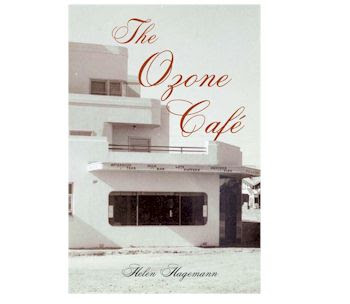2009 OVERLOAD POETRY FESTIVAL HIGHLIGHTSI had never been to the festival before and I was charmed by the friendliness of Melbourne poets. They kiss & cuddle! Or was that after the beers? Nevertheless, the festival gigs that I attended were exhilarating and the poets more so. My first poetry call was the Northcote Social Club on Wednesday night, 9th September. The Slam Heat got off to a great start, MC'd by a lively and well-spoken Ninja in a Black T-shirt Crazy Elf (bulging muscles & all). During the night (All-Stars included), I was entertained by new and seasoned performers. I especially liked Gabby Everall's performance with her firstly whipping off a silver lame jacket, and then taking the risk to speak about the body & its invasion. Author of
Dona Juanita - and the love of boys, Gabby performed a similar medley of words from that dark undercurrent of female experience that often brings women to poetry. Geoff Lemon was also a standout poet, delivering a well-paced, funny, entertaining, oft serious troupe of modern day harangues. A duel act at the end of the slam was also a highlight. The winner Steve, seated next to me, said he was broke and so welcomed his prize of $10. When it came to the best performances on the night in the All-Stars line-up, I think Lewis Scott and Maxine Clarke shone in their individual, inimitable style. They made me listen and hunger for more of their cultural rhythm & soul. My contemporary Ali Cobby Eckermann was by far the most uplifting performance of the night. I wholeheartedly concur with Koraly Dimitriadis's review
Overland Overloaded, that we are so ignorant of Australia's Stolen Generation and the latest Intervention imposed on our indigenous brothers & sisters. And yes, when I listen to Ali Cobby Eckermann’s poetry I want to punch
"The Minister's" lights out, but at the same time I am pleased that she is informing us of her personal struggles within her beautiful, heart-wrenching, poetic elegies.
Next stop: Fitzroy High School. Poets Lewis Scott, Kimberley Mann, Warren Burt and myself entertained years' 8's and 10's. Year 8's are writing narrative and year 10's are studying the Beats, especially Ginsberg's
Howl. Some students strained to listen, while others contorted with boredom. However, thanks to James Waller's intermittent rescues, like getting the student to click pens, and then asking them up to read, it all went fairly smoothly in the end. The highlight for me was that several students spoke to us at the end of the session, and away from the pressure of their peers confessed that they had enjoyed the poetry. One young man is going to be invited to next year's Overload after reading his poem to the class with confidence and enthusiasm.
City Library, Flinders Lane, Melbourne was next. I awaited in anticipation for more stories from Ali Cobby Eckermann in the session
Stolen Voices. Chaired by Kevin Brophy (Uni of Melb), I gained more insight into the massacres of aboriginal people. Ali confessed that in her travels now as a teacher of aboriginal children she is also learning more of the sad histories and stories of her people. Dr Tony Birch - Writer, Curator and Lecturer, Creative Writing at The University of Melbourne gave an informative talk on his experiences working with indigenous poets and students. Lewis Scott - Jazz Poet and performer from Wellington, New Zealand again performed his cultural enlightenment wherein he remarks, 'In my father's house are many mansions. If it was not so, I would have told you.' As an interpretation, I would say Lewis delivers a twenty minute monologue that is meant to have a unifying effect, wherein he tells us as human beings we are all one and the same, we have parents, a birth mother who delivers us into a cruel world. And once we are on that path it is for us to walk that path alone, to discover the self in the larger world, experiencing the sins and the revelations. How we deal with that world and the self is very much up to us.
Launch of the New Poets Series 2009 at the Dan O’Connell was the "pièce de résistance". Kimberley Mann, Ali Cobby Eckermann and myself launched our new poetry books. Ron Pretty our mentor, poet and editor spoke highly of each poet, first with a short biography which also included our back cover reviewer's comments. We read for 12 minutes to great applause from an audience of around sixty people. Teresa Bell, Director of the Australian Poetry Centre, spoke about the publishing opportunity now undertaken by the Centre. She also congratulated each poet as unexpected high sales of our books had been achieved with Ali Cobby Eckermann selling out!
I want to sincerley thank
James Waller & the team of Overload for putting on such a wonderful festival. I wish I had taken the time to go to all events. I want especially to thank the Melbourne poets, and invited poets who I met for the first time, for truly being my contemporaries. Thank you: Andrew from ACT,
Benjamin Theolonius Sanders,(sorry I missed your reading!), Johnny, Steve Smart, Denice Smart, Susan Fealy, Ann de Hugard, Michael Reynolds,
Luis Gonzalez Serrano, Lewis Scott and Warren Burt.































